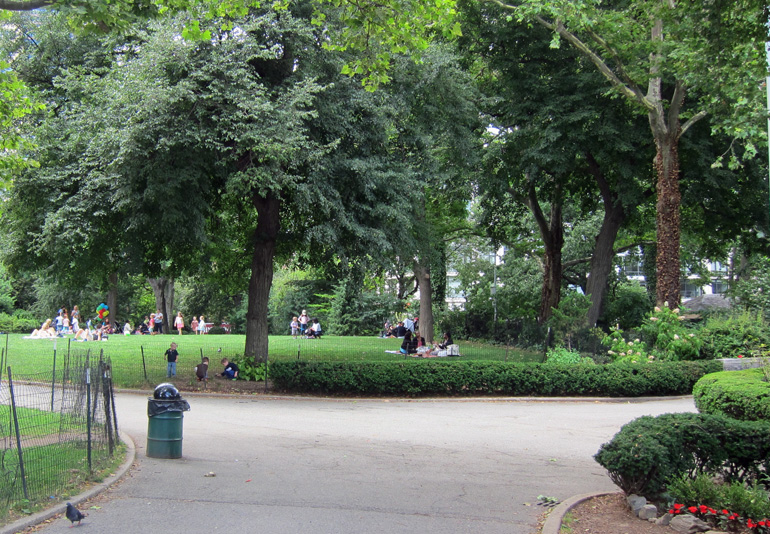Gotham Diary:
Captain Kirke
9 July 2012
Monday, July 9th, 2012
This Fourth of July, I spent the day reading. All of it. I did not watch the fireworks; I did not leave the apartment. I scarcely left my reading chair.
The book in question — for it was one book — was Wilkie Collins’s No Name, a novel that I’d never heard of when Kathleen found it on the shelves at the London Review Bookshop in May. She read it in one go, mostly on the plane coming home, absolutely unwilling to put it down. It took the book longer to hook med; the First Scene’s idyll cum catastrophe seemed to involve a lot of stuffy Victorian attitudinizing. But once Magdalen made her escape, and the story got rolling, it carried me along as gleefully as any amusement-park ride.
For sheer fun, the Fourth Scene can’t be beat. Set at Aldborough (Aldeburgh) on the Suffolk coast, it is a high-pitched match — liken it to tennis or to chess as you will — between two wily plotters whose schemes are so fast and furious that they often blow up, or fall completely flat, with the sardonic levity of Mad Magazine’s “Spy vs Spy” feature. Collins is of course the arch-plotter himself, and his shamelessness is exceeded only by his plausibility. You could argue that a novel as entertaining as No Name can’t be a very great one, but I’m not interested in that kind of talk right now. I believe that anyone my age ought to have read a novel three times before getting carried away by greatness.
And in any case what interests me most about the book, quite aside from the fun of it, is its ending, and what I like about the ending may be proof, to some readers, that No Name is not even a very good novel, much less a great one. I’m not sure that I’d have grasped why I found the ending so satisfying if it hadn’t been for editor Mark Ford’s introductory remarks.
Many, however, have found No Name‘s last chapters unsatisfactory. That Magdalen’s brave odyssey should collapse into such a morass of clichés — rescue by a seafaring strong man, a penitential illness and a sickbed conversion — seems a frustrating elision of the many powerful questions the novel has hitherto posed, though to such as Mrs Olyphant, even this dramatic reversion to the ideals of hearth and home was too little too late.
Were we reading the same book? What “deathbed conversion”? I missed that. Nor did I see Magdalen’s illness as “penitential.” But the “rescue by a seafaring strong man,” now, that didn’t strike me as a cliché at all. D’you know why? From the moment that Captain Kirke made his brief appearance in the middle of the novel, I knew that Magdalen was going to end up in his arms, or at least that’s where I wanted her to end up, because without being entirely conscious of what I was going on I did something that lawyers call “incorporation by reference.” Captain Kirke was a reference, whether Collins intended him to be or not, to Jane Austen’s Captain Wentworth, and when things did indeed work out as I’d hoped, the last thirty-odd pages were charged with all the power of Persuasion, an effect greatly intensified by the fact that I hadn’t just read Persuasion.
Let me be very, very clear about one thing: I have no idea of Collins’s influences. I don’t know that he ever read Persuasion. I’m fairly certain that any reminiscence is unintentional; that, in fact, Collins would have cloyed the ending if he had undertaken it as an homage to Austen’s last novel. The simple truth is that both novelists fastened on a type of English hero that, while not overly common, is instantly recognizable. Collins describes the type very well, seeing him through Magdalen’s eyes and thus capturing the particular flavor of the hero-worship:
She sat listening to him with a breathless interest, looking at him with a breathless wonder, as those fearful stories — made doubly vivid by the simple language in which he told them — fell, one by one, from his lips. His noble unconsciousness of his own heroism — the artless modesty with which he described his own acts of dauntless endurance and devoted courage, without an idea that they were anything more than plain acts of duty to which he was bound by the vocation that he followed — raised him to a place in her estimation so high above her, that she became uneasy and impatient until she had pulled down the idol again, which she herself had set up. It was on these occasions that she rigidly exacted from him all those little familiar attentions so precious to women in their intercourse with me.
You can’t imagine Anne Elliot exacting attentions from Captain Wentworth, but then Anne is like Magdalen’s sister, Norah — patient. Magdalen has, in the course of the novel, exhibited plenty of “dauntless endurance” herself, and plenty of courage as well. She deserves more than a happy ending; she deserves an apotheosis, and that’s what she gets in Captain Kirke. An apotheosis is nothing but a cliché seen in an unflattering light by someone in an ungenerous mood. Â
***
An even guiltier pleasure is imagining what Anthony Trollope would have made of No Name. Thrown it into the fire, he would have. Magdalen Vanstone, insofar as she is the heroine of a novel who finds happiness in the end, stands as a repudiation of everything that Trollope believed about young ladies. The catechism is set forth in The Small House at Allington, in which Lily Dale plights her troth to an unworthy cad, Adolphus Crosbie, and thereafter refuses to acknowledge that Crosbie’s withdrawal from her life permits her to entertain the affections of the worthy man who really loves her, Johnny Eames. Readers begged Trollope to bring Lily and Johnny together in a later book, but he steadfastly refused to do so, because his belief that a good woman can love only once was an article of personal religion. It was also an article of his artistic practise, and that’s why I had to stop reading Trollope: he was prescribing his romances, not describing them.
When Magdalen Vanstone falls in love with Frank Clare, it’s puzzling, because Magdalen is such a strong girl and Frank is such a wuss. You wonder: is Magdalen going to be the making of this young man? Even if you’re clever, like me, and foresee that Frank’s path will cross Captain Kirke’s (how could they not? they’re both in China; and, yes, that’s a joke of sorts), you don’t know what Collins is going to do with Frank when it comes time to tie up all the knots. In any case, Magdalen outgrows the boy. He behaves badly and she gets over it. Frank’s father writes, at the end, to tell her what has become of his son. “The time when it could have distressed her, was gone by; the scales had long since fallen from her eyes.” Scales don’t exist, somehow, for Trollope, and this makes his love stories awkward, because nobody can ever grow up.
No Trollopean heroine would ever dream of embarking on Magdalen’s vengeful adventure, either. Trollope must have hated the very success of Magdalen’s bold impersonations. Nor could he have believed in rehabilitation for a swindler like Captain Wragge. It is impossible not to imagine Trollope waxing mighty indignant. Presenting a minx and a scoundrel in a warm, favoring light: how awfully immoral he must have found it!
He probably had the sense not to read it. Â
***
The question raised by my positive feelings about the ending of No Name is this: what kind of literary criticism am I practising when I “incorporate by reference” the whole of one novel into the body of another, giving the second a kind of experiential credit? By insisting that No Name gave me great pleasure because I was singularly well-reminded of Persuasion? Does my report have any value? Or is it the unhelpful equivalent of saying, “I really liked it!”
I believe that it does have value, that it is extremely important to be candid about the pleasures of fiction, howsoever they derive. I note that Captain Kirke reminded me of Captain Wentworth in a way that I would not see Captain Wentworth’s reminding me of Captain Kirke. Reading Persuasion, I might well be reminded of the example of Captain Kirke, as another “seafaring strong man.” But I would not say that Persuasion is like No Name. This connection runs one way only, and it ought to be clear that the point of my remarks is not, certainly not to propose an equivalence between the two novels. No Name is, one might argue, a lesser novel precisely because Persuasion can be read into it. Nothing can be read into Persuasion, or into any of Jane Austen, except perhaps shreds of Dr Johnson’s cadences. Jane Austen needs no help from me.
But if Wilkie Collins does, if he can use that help — if No Name becomes a more satisfying book if you’ve read (and loved) Persuasion — then I’m happy to give it. I’m happy to help myself, in short. No Name might not be a better novel, but it becomes a more engaging one because of what I bring to it. The matter interests me very much as a function of age. I read, as it were, ensconced on an ever-growing and now rather massive cloud of prior reading. There’s no telling or how it might adapt my reading posture, or what I might reach in and pull out of it.
The idea of evaluating a novel in isolation, judging how well it functions as a self-contained contraption, is by now vieux jeu. We read for pleasure, not for liturgical exercise. In the end, “I really liked it” must be the (unstated) premise of every critical response; “I didn’t like it” ought to warn the writer to stop right there, for nothing that follows will be of any serious interest (however rib-tickling the take-down). If you want to tell the world that you liked something, then you must be as fully honest as you can be, and admit to accidental attractions aong with the high-minded ones. In the case of No Name, I don’t see anything particularly accidental about my being reminded of Persuasion. It can be taken as understood that, at this point, I’ve read all of Jane Austen three or four times at least. (Just as it can be taken as understood that I’m unable to finish Moby-Dick.) And how keen the pleasure, in such a jolly book, to feel the warmth and generosity of a novel so much more austere. Â







